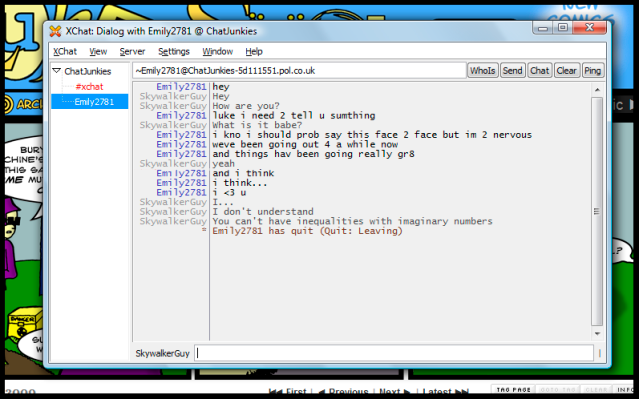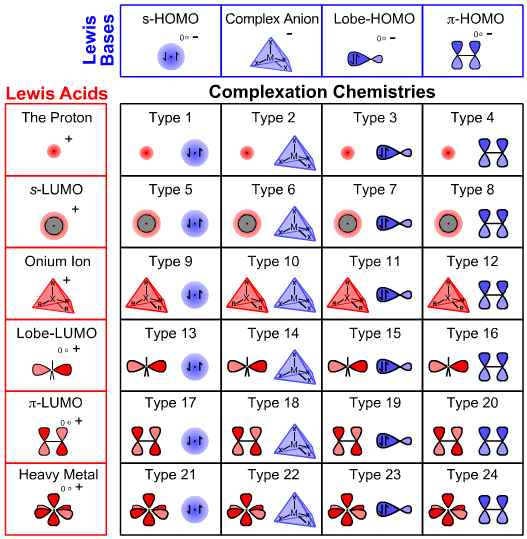I thought each guest paid $8 and 1/3 of the 25-dollar bill, so one more dollar would be $9 and 1/3, and if you multiply that by 3, then that would be $28. The bellhop has the other two bucks. I dunno how a dollar can be split into an exact one-thirdRuldra wrote:Three guests check into a hotel room. The clerk says the bill is $30, so each guest pays $10. Later the clerk realizes the bill should only be $25. To rectify this, he gives the bellhop $5 to return to the guests. On the way to the room, the bellhop realizes that he cannot divide the money equally. As the guests didn't know the total of the revised bill, the bellhop decides to just give each guest $1 and keep $2 for himself.
Now that each of the guests has been given $1 back, each has paid $9, bringing the total paid to $27. The bellhop has $2. If the guests originally handed over $30, what happened to the remaining $1?
SHMUPS: MATH THREAD
Re: SHMUPS: MATHEMATICIANS HELP (srsly)
Re: SHMUPS: MATHEMATICIANS HELP (srsly)
It's a trick question. Read it closer 
The "extra dollar" only happens if you didn't follow it all correctly
The "extra dollar" only happens if you didn't follow it all correctly
@trap0xf | daifukkat.su/blog | scores | FIRE LANCER
<S.Yagawa> I like the challenge of "doing the impossible" with older hardware, and pushing it as far as it can go.
<S.Yagawa> I like the challenge of "doing the impossible" with older hardware, and pushing it as far as it can go.
Re: SHMUPS: MATHEMATICIANS HELP (srsly)
Hahah. The totals changed from 30 to 25! The guests paid 27 bucks for a 25-dollar tab - the extra two dollars were taken by the bellboytrap15 wrote:It's a trick question. Read it closer
The "extra dollar" only happens if you didn't follow it all correctly
Re: SHMUPS: MATHEMATICIANS HELP (srsly)
...what?Ruldra wrote:Three guests check into a hotel room. The clerk says the bill is $30, so each guest pays $10. Later the clerk realizes the bill should only be $25. To rectify this, he gives the bellhop $5 to return to the guests. On the way to the room, the bellhop realizes that he cannot divide the money equally. As the guests didn't know the total of the revised bill, the bellhop decides to just give each guest $1 and keep $2 for himself.
Now that each of the guests has been given $1 back, each has paid $9, bringing the total paid to $27. The bellhop has $2. If the guests originally handed over $30, what happened to the remaining $1?
That doesn't make sense...
www.twitch.tv/illyriangaming
<RegalSin> we are supporting each other on our crotches
<RegalSin> we are supporting each other on our crotches
Re: SHMUPS: MATHEMATICIANS HELP (srsly)
xbl0x180 alreqady said it; it's a trick question. Initially $30 were paid. $25 were kept by the hotel, $2 were kept by the bellhop, $3 were returend to the customers. The guests thus paid a total of $27 ($25 + $2 which the bellhop kept). The question makes it seem like in the end there were $27 PLUS $2, while in reality the $2 dollars the bellhop kept came out of those $27. Makes sense now?Illyrian wrote:...what?Ruldra wrote:Three guests check into a hotel room. The clerk says the bill is $30, so each guest pays $10. Later the clerk realizes the bill should only be $25. To rectify this, he gives the bellhop $5 to return to the guests. On the way to the room, the bellhop realizes that he cannot divide the money equally. As the guests didn't know the total of the revised bill, the bellhop decides to just give each guest $1 and keep $2 for himself.
Now that each of the guests has been given $1 back, each has paid $9, bringing the total paid to $27. The bellhop has $2. If the guests originally handed over $30, what happened to the remaining $1?
That doesn't make sense...
-
tinotormed
- Posts: 1069
- Joined: Mon May 24, 2010 10:08 pm
- Location: Philippines
- Contact:
Re: SHMUPS: MATHEMATICIANS HELP (srsly)
The cowboy's back again!mesh control wrote:Here is the accuplacer if it helps
http://www.collegeboard.com/prod_downlo ... sample.pdf
First question on page 7.
Hmmm, I'll look that over. Thanks, Sapz.
Yup, I am currently taking up algebra in my college degree. I may actually sole some certain problems here. I got 1 and 2 so far.
Re: SHMUPS: MATHEMATICIANS HELP (srsly)
Once I got to the first quarter of Physical Chemistry that goes into quantum physics, I had to take a coupla stiff drinks before I jumped in and attempted to solve some of this crap:

Thermodynamics completely lost me and I had to repeat the whole f*****g thing. That s*** felt like the Mushihimesama Futari and DFK true bosses combined. I suggest studying the kind of math wall street uses since the bankers never seem to lose


Thermodynamics completely lost me and I had to repeat the whole f*****g thing. That s*** felt like the Mushihimesama Futari and DFK true bosses combined. I suggest studying the kind of math wall street uses since the bankers never seem to lose

Re: SHMUPS: MATHEMATICIANS HELP (srsly)
Good luck for thermo xblox, you'll need it.
AS for the i <3 u joke, this is fun
AS for the i <3 u joke, this is fun
Bravo jolie Ln, tu as trouvé : l'armée de l'air c'est là où on peut te tenir par la main.
-
mesh control
- Posts: 2496
- Joined: Mon Dec 21, 2009 1:10 am
- Location: internet
Re: SHMUPS: MATHEMATICIANS HELP (srsly)
That is beautiful.xbl0x180 wrote:Once I got to the first quarter of Physical Chemistry that goes into quantum physics, I had to take a coupla stiff drinks before I jumped in and attempted to solve some of this crap:
lol
Re: SHMUPS: MATHEMATICIANS HELP (srsly)
Oh, I cruised controlled and crashed right through that P-chem thermo final with a "C" and never came back. I was a little better with Organic Chemistry and Inorganic Chemistry since they're visual-based. Seriously, if you can put together that crappy IKEA furniture using their instructional picture diagrams, then you can do O- and I-chem. Rather than calculating the probability of finding an electron in the cloud, you are drawing the cloud itself or modeling the shape of the compoundguigui wrote:Good luck for thermo xblox, you'll need it.
AS for the i <3 u joke, this is fun


Hahaha. Funny, Dr. Meyer pops up if you do a general chemistry search. Cool dude

-
mesh control
- Posts: 2496
- Joined: Mon Dec 21, 2009 1:10 am
- Location: internet
Re: SHMUPS: MATH THREAD
A co-worker showed me a great resource today: http://ocw.mit.edu/courses/physics
Self education, here I come.
Self education, here I come.
lol
